Absent from the Atlanta Opera’s repertoire for nine years, Giacomo Puccini’s eternal La Boheme graced the stage of the Cobb Energy Performing Arts Center once again on Saturday, January 20th. Though well received by the nearly sold-out audience, the opening night performance inspired a disparate and puzzling reaction in me, ultimately demanding my attendance to the presentation held the following Friday. Along the way, I gained a greater appreciation for the fragility of performance and for the opera’s magical appeal.
To the best of my recollection, Puccini’s La Boheme and the Atlanta Opera have had a spotty history, particularly in the casting of the principal lovers. Though student obligations (and finances) kept me away from the company’s 1993 and 1999 offering, I was lucky enough to witness the company subsequent productions, starting with a mounting of the work in 2005 where Mark Thomsen’s Rodolfo was soundly defeated both by Sally Dibblee’s radiant Mimi and the Civic Center’s merciless dimension. The story repeated itself five years later, this time under the friendlier acoustics of the Cobb Energy Performing Arts Center, with Bryan Hymel’s first Rodolfo unable to assert himself against Grazia Doronzio’s more idiomatic interpretation of Mimi (Mr. Hymel, of course, has gone on to make a great career for himself in the French Grand Opera repertoire and we wish him well). When the opera returned to the repertoire in 2015, the situation would revert itself, with the Rodolfo of the rambunctious Gianluca Terranova bullying the serviceable Mimi of Maria Luigia Borsi into oblivion. Though uneven, these performances qualified as more than perfunctory, solidifying the opera’s bullet proof reputation as an “add singer and stir” endeavor.
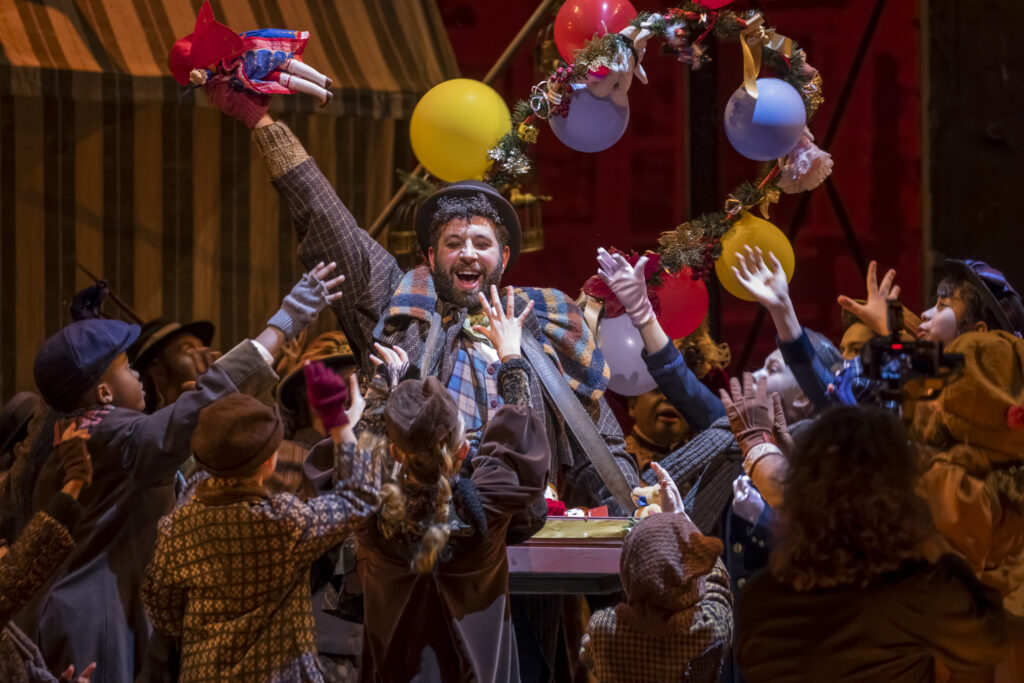
Taking into consideration almost two decades of history, as well as the abrupt interruption brought by the COVID-19 crisis as well as the company’s recent ascent to Opera America’s Budget One status (mo’ money mo’ problems?) I, and the audience, were ushered into a revival of the original production conjured by General & Artistic Director Tomer Zvulun, Scenic & Projection Designer Erhard Rom and Costume Designer Martin Pakledinaz nine years earlier. As it was the case back then, the Bel Epoque period update and generally traditional staging provided an appropriate vehicle for the evening to unfold.
For this revival, however, General & Artistic Director Zvulun handed directing responsibilities to Staging Director Gregory Luis Boyle, and here is where I suspect things took a turn. The first two acts of La Boheme can strike the audience as aggressive, in a way similar to Act I of Cilea’s Adriana Lecouvreur and Act II of Giordano’s Andrea Chenier – they all feature an explosion of characters delivering exposition at rapid speeds. As one of La Boheme’s central themes revolves around the friendship shared by the principals, Director Boyle focused much attention to these sequences, often enlisting the collaboration from the pit to allow the various gags and loopy interactions to play out. This may have inadvertently gotten the better of everyone by instigating the pitfalls which loom over all opening night performances. The debut of maestro Jonathan Brandani became the evening’s most significant casualty off the bat. Unable to establish a consistent pace with the orchestra because of all the stage goings-on, he found himself unable to develop synergy between the pit and the stage. More troubling for those in the auditorium, the orchestral voice lacked presence, and the sound seemed to dissipate in a way that made the company’s brief time at the Boisfeullet Jones Civic Center so unsatisfactory. Troubles at the pit soon made their way to the stage, with the capable cast struggling to navigate through a very physical direction and a maestro constantly trying to catch up to them. The end of the first scene found many of the principals defaulting to survival strategies, and that became the essential rot that took a hold over the evening.
I greeted the curtain calls with a puzzled grimace, ready to declare a performance that curiously never found its footing – the alchemy refused to set. And yet I found myself unable to claim these words as a final verdict.
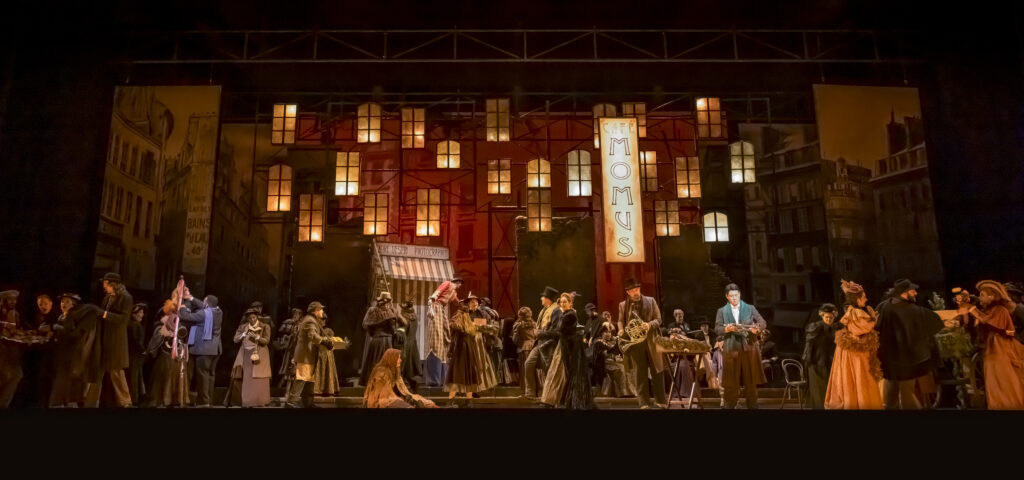
Photo credit: Raftermen
Do allow me to expand on this: I have lived through AWFUL performances of this opera – student productions, fringe company productions, presentations in the street (in English) by singers of suspect pedigree with a piano, without a piano, with a boom box, at Coachella…etc. Even in those conditions, La Boheme still managed to “function” even in its barest form if the balance of the piece was respected. Here we have a professional company staging a surefire hit, with singers of extraordinary talent able to present valid presentations of their parts at any “A-level” opera house in the world, and yet my heart and ear refused to connect with the performance in any way. I am essentially a member of the public first and reviewer second, so this bothered me at a very personal level and I simply would not let it go. By the time I returned to the theater the following Friday the dust had finally settled around the production, with both musicians and cast, now better acclimated to the pace of the direction, able to produce a most satisfying and well-balanced performance under the newly confident baton of maestro Brandani. Friday night’s performance also validated some of Director Boyle’s gambles, as he held the sold-out audience in tense, rapt silence as the opera came to its heart breaking conclusion.
Making his Atlanta Opera debut in the role of Rodolfo, tenor Long Long revealed himself as the winner of this comparative review. The profile of his instrument is that of a full lyric tenor of ample sonority and silvery timbre. The placement between the registers is securely established, though well separated within the scale, with the extreme top betraying a bright, pinched quality foreign to the rest of the instrument. The tenor was the most palpably affected by the jitters of the premiere, made the more frustrating when he revealed flashes of what he could otherwise offer. He strikes the ear as a singer who is well aware of his limitations, one who was quick to restrain the intensity of his vocalism and favor a technical safe space. It caused him to fall short for his debut, and I had to wait for the Friday night performance for Puccini’s young poet to finally arrive. It was then, particularly during the opera’s final two acts, when Mr. Long allowed his instrument to enter the heightened expressive zone, filling Rodolfo’s emotional phrases with passionate fervor. I closely monitored his Friday night performance in my effort to determine what had changed, and noticed a new strategy in his movement: He would rush to fulfill a directional obligation, and quickly engage his platform with his right leg in order to activate the mechanism of his art. There’s a reason they gave singers capes back in the old days, I suppose.
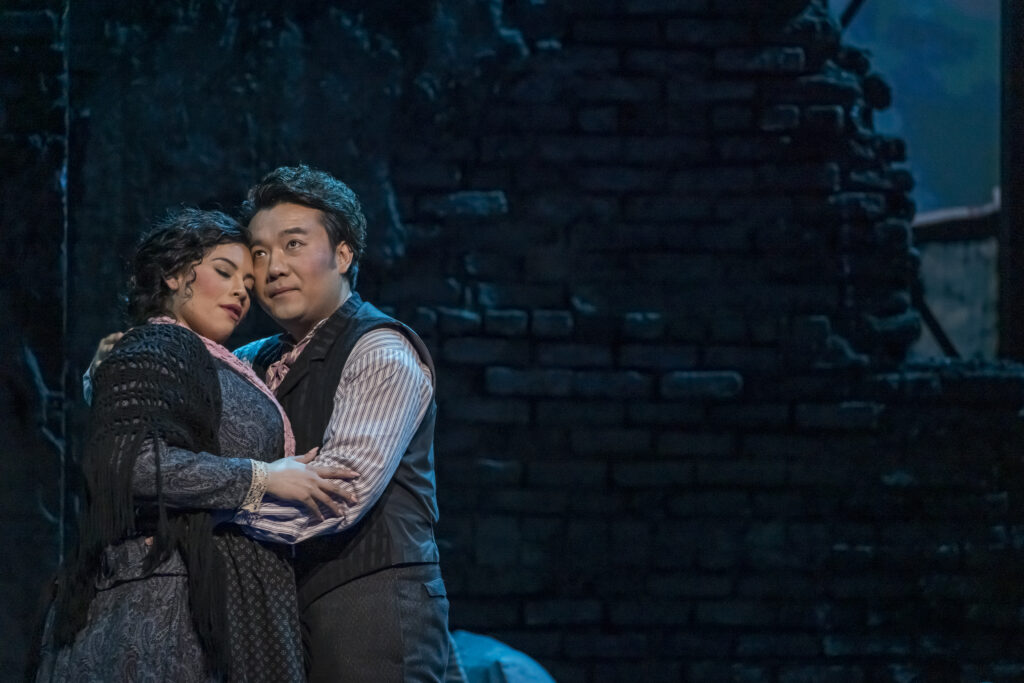
Photo Credit: Raftermen
Entrusted with the legendary role of Mimi, soprano Gabriella Reyes made her Atlanta Opera debut in a role that has already been tested on the stages of Glyndebourne and Washington National Opera. Fresh from her successful HD transmission as Rosalba in the Metropolitan Opera’s premiere run of Catan’s Florencia en el Amazonas, she arrived to Atlanta with the glittering buzz of a rising star, and cemented her reputation with these performances. Her interpretation is graced by a sumptuous, glamorous instrument which projects exceptionally well in the large auditorium of the Cobb Energy Performing Arts Center. As the performance wore on, however, it became evident that Ms. Reyes embodies both the joys and trappings of the modern school. The placement of her scale is secure, allowing her overtones to expand comfortably over a large space. The top notes have a lovely dome that grace her phrases charmingly, though these could become audibly strained when pressured. Her middle and chest registers are disconnected, limiting her expressive possibilities and requiring the artist to distort her instrument through sobs, shouts and cries in order to make her point through the emotional trials of the later acts. Her declamation lacks clarity, and her diction got lost in the waves of otherwise warm, beautiful sound. These limitations, a constant trapping of modern schooling, held Ms. Reyes back in the many instances where she appeared truly engaged in Mimi’s situation – she gave the impression of wanting to do more than her technique allowed. Still, she is as good a Mimi as we’d hope to hear in 2024. One hopes that the momentum of her career will not impede further artistic growth.
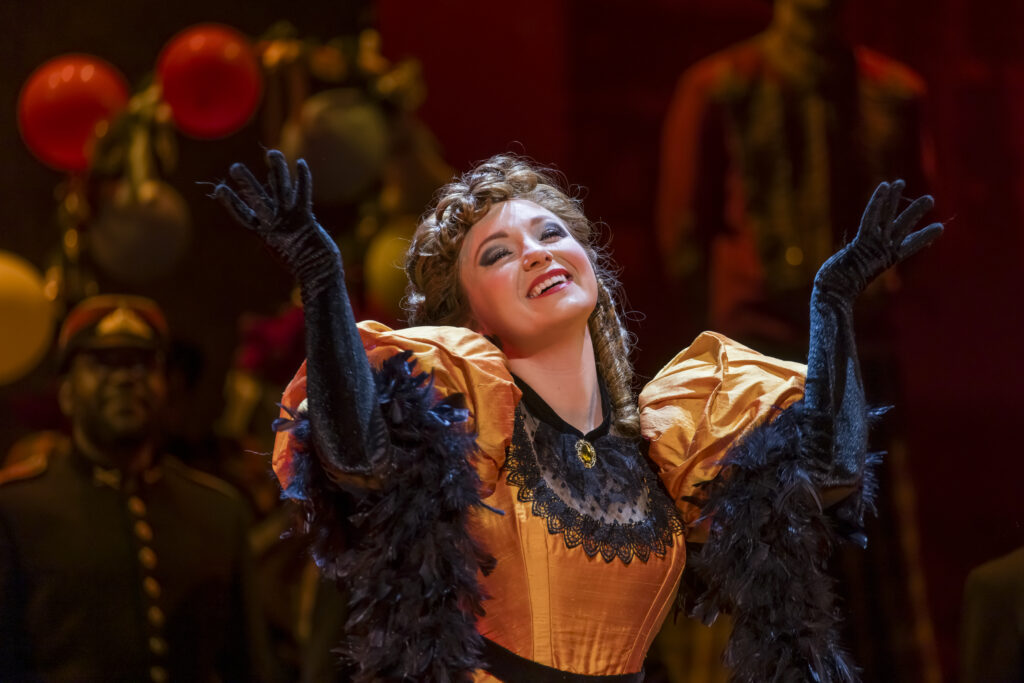
Taking over for the previously announced Zachary Nelson, baritone Thomas Glass presented an effective Marcello by providing a stark vocal contrast to the pristine warbling of his tenor bestie. His instrument is comprised of a rougher material, aided by an earthy grit which demanded the attention of the audience even against the cacophony of the ensemble. His descriptive vocalism was alert, and responsive up the scale by a characterful hook. It guaranteed an endearing and engaging interpretation. His feisty partner was entrusted to soprano Madison Leonard, who introduces herself to the Atlanta Opera audience as Musetta. Her plaintive voice is a smokey leggiero instrument of delightful character, most valid for the assignment, and was best heard when unchallenged by the orchestral wall of sound. This made for better hearing of her famous waltz when presented as the original soliloquy rather than its concerted reprise. Her offstage introduction in Act III confirmed this observation. Dramatically, Ms. Leonard took advantage of every opportunity to reform her character before the audience in the opera’s final act and cut a striking figure onstage. It would be interesting to reassess this artist under more substantial assignments better suited to her proclivities.
The Schaunard of bass-baritone Jongwon Han and the Colline of bass-baritone Christian Simmons completed the gang of Bohemians and both frequently combined their efforts so as to not stray too far from their busier colleagues. Curiously, they both gravitate towards the baritonal side of their fach, a pesky observation that mainly called out Mr. Simmons as he bid farewell to the group’s collective youth in the tremendous coat aria “Vecchia zimarra”. One final observation, which inspired me to gag twice upon noticing: Veteran bass Philip Cokorinos is mentioned in the program as making his Atlanta Opera debut in these performances as Benoit and Alcindoro, and though I do not want to get anyone in trouble, I cry foul. Philip Cokorinos is a legend who has been contributing to the success of Atlanta Opera performances for decades. I recall vividly his participation in the company’s historic production of Bellini’s I Capuleti e i Montecchi in 1999, which still ranks as one of the most spectacular performances in the company’s history. He has since returned to Atlanta for performances of Mozart’s Le Nozze di Figaro and Don Giovanni, Wagner’s Der Fliegende Hollander and Strauss’ Salome. Needless to say, he had the audience eating out of his hand as both Benoit and Alcindoro, eclipsing cast, chorus and even Musetta’s feisty pup Sophia. Mr. Cokorinos, your audience remembers and celebrates you.
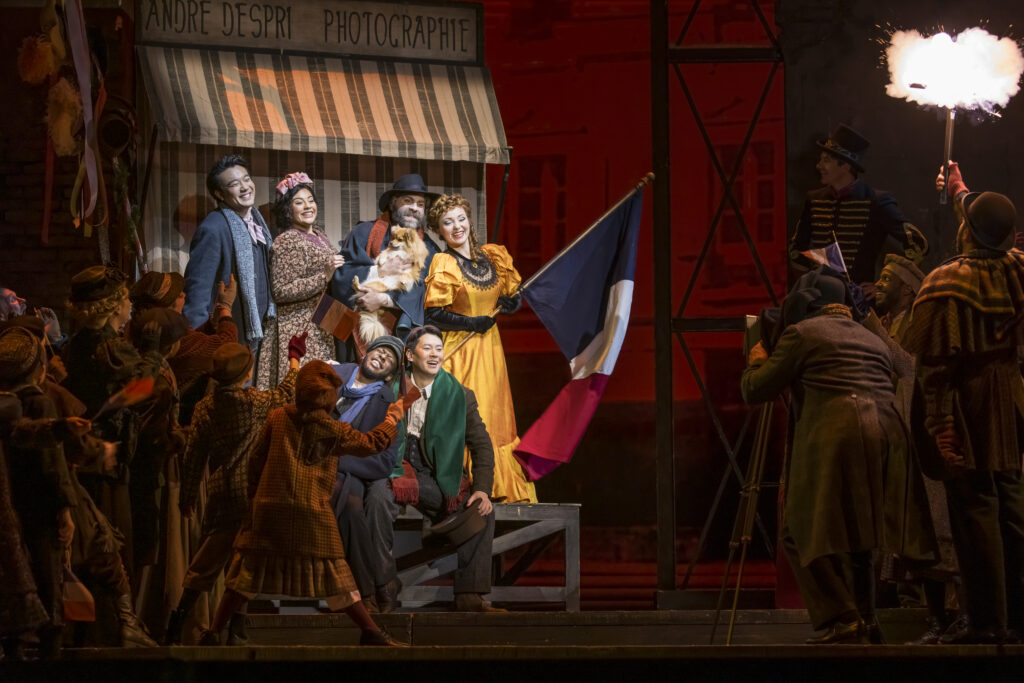
Photo credit: Raftermen
The Atlanta Opera 2023-24 Season continues with the company’s first performances of Britten’s A Midsummer Night’s Dream. For tickets and more information, please visit the company’s website at www.atlantaopera.org
-Daniel Vasquez